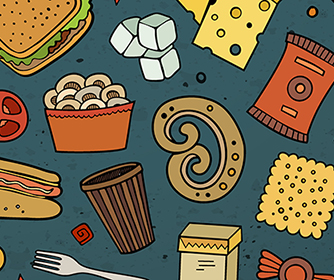UTSA researcher: Do children eat less junk food if they’re breastfed longer?

UTSA professor Dylan Jackson, colleague examine breastfeeding duration, socioeconomic status and junk food intake in kids
(Feb. 2, 2017) -- Breastfeeding for longer could help some children curb their junk food intake later in life, according to new UTSA research published in Public Health Nutrition.
Dylan B. Jackson, a criminal justice professor in the UTSA College of Public Policy, and his colleague, Kecia R. Johnson of Mississippi State University, studied data from the U.S. Department of Education related to the development of 10,000 American children from birth to age five. They hoped to determine whether infant breastfeeding, paired with family socioeconomics, would impact junk food consumption in children.
Jackson and his collaborator were also interested in examining whether race and ethnicity would affect their research findings, particularly among white, Hispanic and black families.
The researchers used data compiled over several years by the National Center for Education Statistics to review key points during the development of 10,000 children. Between ages nine months and two years, mothers were asked whether they breastfed their child and, if so, for how long. By the time the children were in kindergarten, those same parents were asked to report the frequency of their children’s junk food consumption over a seven-day period.
Junk food, in this case, was defined as fast food, soda/other sugary beverages, salty snacks or sweets. Families were categorized as being low or high in socioeconomic status.
Across racial and ethnic groups, the researchers found that breastfeeding duration had little to no effect on the junk food consumption of children from high socioeconomic families.
However, Jackson and Johnson found that breastfeeding was associated with less frequent junk food consumption among black children of low socioeconomic status.
“Being breastfed was consistently associated with lower junk food intake across all junk food types among black children of low socioeconomic status,” Jackson said. “Black mothers, however, tend to breastfeed less and for shorter durations than other mothers in the sample.”
The researchers urge future studies on the topic to explore the mechanisms that might further explain their findings.
“Black women have historically been the least likely to initiate and continue breastfeeding compared with other racial and ethnic groups in the U.S.,” Jackson said. “There are a variety of social, historical and cultural reasons for it. Based on our findings, there are significant and consistent connections between duration of breastfeeding and appetite for junk food among black children of low socioeconomic status, however.”
The researchers hope to identify and promote strategies that assist women in their efforts to breastfeed should be made. Their goal is to create a healthier future for children, particularly black children from low socioeconomic families.
In particular, Jackson and Johnson point to the federal Women, Infants and Children (WIC) special supplemental nutrition program as a useful point of intervention since black women are often overrepresented among WIC participants. The WIC program also offers breastfeeding peer counseling services, which could serve as an added opportunity for educational, emotional and social support for mothers.
UTSA is ranked among the top 400 universities in the world and among the top 100 in the nation, according to Times Higher Education.
-------------------------------
Learn about the UTSA Department of Criminal Justice, based in the College of Public Policy.
Connect with UTSA online at Facebook, Twitter, YouTube, Instagram and LinkedIn.
Events
Move In To COLFA is strongly recommended for new students in COLFA. It gives you the chance to learn about the Student Success Center, campus resources and meet new friends!
Academic Classroom: Lecture Hall (MH 2.01.10,) McKinney Humanities BldgWe invite you to join us for Birds Up! Downtown, an exciting welcome back event designed to connect students with the different departments at the Downtown Campus. Students will have the opportunity to learn about some of the departments on campus, gain access to different resources, and collect some giveaways!
Bill Miller PlazaCome and celebrate this year's homecoming at the Downtown Campus with food, games, giveaways, music, and more. We look forward to seeing your Roadrunner Spirit!
Bill Miller Plaza

